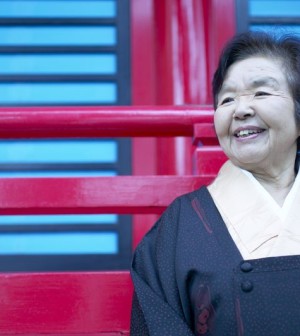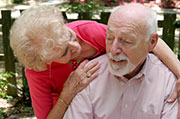- 8 Ways to Increase Dopamine Naturally
- 7 Best Breads for Maintaining Stable Blood Sugar
- Gelatin vs. Collagen: Which is Best for Skin, Nails, and Joints?
- The Long-Term Effects of Daily Turmeric Supplements on Liver Health
- Could Your Grocery Store Meat Be Causing Recurring UTIs?
- Are You Making This Expensive Thermostat Error This Winter?
- Recognizing the Signs of Hypothyroidism
- 10 Strategies to Overcome Insomnia
- Could Artificial Sweeteners Be Aging the Brain Faster?
- Techniques for Soothing Your Nervous System
My Father’s Keeper: Caring for a Parent With Dementia


Part two of a two-part series
Four years ago, Kate Phillips became a family caregiver without quite realizing what she was getting into.
Her father, then in his late 70s, was recovering from a series of surgeries in a Denver nursing home, which was pressing the family to make other arrangements for him.
Phillips, living near Seattle with her teenage daughter, and her brother felt that returning to independent living at a distance from them would be “disastrous” for their father, who was showing signs of mental decline.
“The thought was ‘I had a big house and I’ve got plenty of room — he might as well move in with me,'” she recalled.
Today, Phillips’ father still lives in her home. In hindsight, she said, the arrangement might not have been the best choice.
With an aging U.S. population, many adult children struggle to care for parents with Alzheimer’s or other forms of dementia without enough support to do so.
Yet these informal caregivers provide a huge service. According to an Alzheimer’s Association report, they provided about 17.5 billion hours of unpaid care in 2012 alone, “a contribution to the nation valued at more than $216 billion.”
Recently, a Johns Hopkins study delved into the lives of some Baltimore residents with dementia and their informal caregivers.
The vast majority of volunteer caregivers lacked referrals to resources for professional assistance or service. And they lacked education on how to perform the day-to-day tasks of being a caregiver.
About three-fourths of caregivers were women. Their average age was 66, and they spent nearly seven hours a day providing care.
Safety is a constant concern for many caregivers
For Phillips, the reality of being a caregiver came swiftly. “Probably within the first 10 days,” she said.
Three days after moving in, since she didn’t yet have a grab-bar installed for her shower, her father instead took a bath. But he didn’t have the muscle strength to get out of the tub. She couldn’t get him out either and she had to call 911.
Phillips’ father also has diabetes, and keeping his diet and blood sugar in check is challenging.
Caregiving means meeting his small needs throughout the day: restroom and hygiene reminders, bed changes, and meal preparation and supervision. “Everything’s got to be served, plated, portioned and whatnot,” she said.
Safety is an ongoing concern. One day, Phillips’ father built a “roaring, roaring fire” in the wood-burning stove in their living room. He left the stove door open, she said, and she came home to find the fire “sparking 12 inches away from the carpet.”
With incidents like these, Phillips felt less and less able to leave him alone.
“I just basically changed my entire career in business so that I could work from home,” she said. The financial impact, she noted, has been “enormous.”
Among caregivers with jobs, about 65 percent report having to go into work late or leave early because of their caregiving duties, and one in five has had to take a leave of absence, according to the Alzheimer’s Association.
Family caregivers report positive feelings such as family togetherness and the satisfaction of helping each other, the association also found. But 67 percent of dementia caregivers report high or very high levels of emotional stress.
The decision to be a caregiver ‘can be different for everybody’
Whether it’s best to take a parent with dementia into your home “is a personal decision,” said Beth Kallmyer, vice president of constituent services for the Alzheimer’s Association.
“One of the things that I talk to families about is what the impact might be,” Kallmyer said. “It can be different for everybody. But you can walk it through . . . ‘Do we have space, first of all? Are we going to be able to provide the right level of supervision as the disease progresses? How are we going to do that? What’s it going to mean to my relationship? What’s it going to mean to my kids?'”
Services and programs are available, Kallmyer stressed, including through the Alzheimer’s Association 24-hour helpline, federal and state elder care locators, and local caregiver-support networks.
Phillip’s father now spends two days a week in an adult day health program. It’s professionally staffed, it’s social, he enjoys it and he “comes home with a sparkle in his eye,” Phillips said.
The respite is important to her as well. For a few hours, she can turn off the feeling she has as a caregiver — “like you’re always failing, not doing enough for yourself or your loved one.”
Sara Shelton, a gerontologist and owner of Seattle Aging Solutions, described some of the tipping points when caregiving at home becomes too burdensome.
“A lot of times with Alzheimer’s or dementia there’s changes in sleep patterns. So you’re sleeping during the day and up all night,” Shelton said. Or, she said, it’s a change in the person’s condition, when the physical demands become too great for just one person.
But most often, she said, the breaking point “usually comes down to emotional stress — the caregiver begins experiencing anxiety or physical problems they can’t manage.”
The Phillips family is starting the transition process.
Phillips is working with Medicaid through a program called PACE (Program of All-Inclusive Care for the Elderly) to get her father on a waiting list for a long-term care facility that would meet his medical needs. She believes the change will benefit them both.
“I feel like I have kind of a vision of life after caregiving again, which is great,” Phillips said. “And also, I think I’ve come to the recognition that it would be nice to be my father’s daughter again and not be his caregiver.”
More information
The Alzheimer’s Association provides information and assistance for caregivers of people with dementia.
To read part one of the series, the choice to live alone can be risky for seniors with dementia, click here.
Source: HealthDay
Copyright © 2026 HealthDay. All rights reserved.










